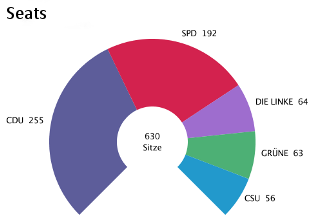The Christdemocratic Union (CDU) is the winner of this year’s German elections. The party could again increase their share of the votes to over 40% and thus suceeded in gaining a considerable plus.
The result of the liberal FDP is atrocious. Their previous result turned out to have been but a speculative bubble and merely marked the beginning of their preliminiary end of presence in the Bundestag.
The Socialdemocratic party (SPD) could slightly improve their results, however, the party still secured one of the worst results in its history. Despite intense campaigning and canvassing they only obtained a quarter of the votes – plus 2.5% compared to the trough of 2009 –, which ought to bring them back down to earth regarding their political possibilities. The party apparently cannot reverse the tectonical changes among their supporters, which resulted from the red-green reform policy of the years 2000-2005. They have permanently lost a substantial part of their voters to the Left party, the non-voters and also to the CDU. The SPD couldn’t win any ground against the CDU in the social centre and neither suceeded in fending off the Left party on their left.
The jaunt of the Greens into new, neo-bourgeois social groups was halted. They obtained a result reflecting the numbers of their traditional voters, on which they focused within the last phase of their campaign. The Greens were confronted with massive headwind from the conservative camp and associated groups, which especially targeted their fiscal plans.
The Left party obtained a respectable result which secured them the third rank over the Greens and the CSU. The party could confirm its result from 2009 and also prove its role as a national party by obtaining more than 5% of the votes in the West.
The Alternative for Germany (AfD) has narrowly missed entry into the Bundestag. In the German party landscape there now exists a protest party in the right, bourgeois spectrum. The AfD not only unites the market-liberal politicians from Union and FDP who disagree with the Euro-policy of the government and the associated joint liability, but could also obtain protest votes from the Left. Their campaigns in the various German states reflect the diversity of forces gathered in the name of ‘alternative’ and gives a taste of the challenges they will face when it comes to the party’s consolidation.
The voter turnout was only slightly higher than in 2009’s trough. Never before in the last 50 years of elections were there so many votes not represented in parliament. If the present result remains as it is, almost one sixth of the votes won’t be reflected in the Bundestag.
The ‘bourgeois’ camp will now have to clarify whether it could be/seeks to be permanently successful with 3 parties or whether a reunion of FDP and AfD under a national-liberal flag would be a better way of securing political power.
The common votes obtained by the CDU, the FDP and the AfD mount up to 52% and thus excel the 49% for the Union and the FDP in 2009. For the second time in a row the ‘bourgeois’ camp lies clearly ahead of the ‘left’ one.
In the ‘left’ camp now everything revolves around the question whether the SPD and the Greens will uphold their claim to sole representation or whether the establishment of the Left party could lead to an enhancement of strategic political options. After the failure of their strategy to go ‘all-in’ with the social democrats, the Greens will need to ponder whether they still wish to declare themselves as a party of a certain political camp or would rather be a border crosser between the camps – in which case they could form a majority with the CDU as well as with the SPD and the Left party.
Long version in German and other first analysis on the website of the Rosa Luxemburg Foundation.
A complementary analysis will be published soon on this website, as well as in the transform! newsletter vol. 9/2013.
